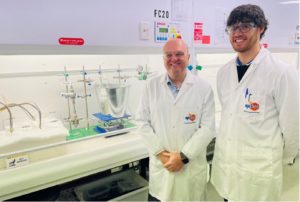PharmAust’s subsidiary Epichem builds ‘world-first’ flow reactor to convert waste into fuel
Health & Biotech
Health & Biotech
The completion of the flow reactor will potentially take PharmAust into the multi-billion dollar bioplastics and bio-ethanol markets.
Clinical stage biotech company, PharmAust (ASX:PAA), has reached a critical milestone in its efforts to develop and promote a disruptive waste-to-fuels technology.
The company’s wholly-owned subsidiary, Epichem, announced today that it has completed building the flow reactor using the benchtop Oxidative Hydrothermal Dissolution (OHD) technology.
The flow reactor, according to Epichem, is a world-first, with the potential to turn a wide range of waste and biomass feedstock into valuable energy products.
It is located at Epichem’s purpose-built state of the art laboratory at Technology Park in Bentley, WA.
“The flow reactor has the ability to create a new innovative and disruptive technology in Australia, and can be scaled up for a range of industry partners and create employment in WA and Australia,” said Epichem CEO, Colin La Galia.
The OHD technology itself was developed by US-based Australian Ken Anderson, founder and chief technology officer of Thermaquatica.
In short, OHD converts solid organic material to low-molecular-weight, water-soluble products using small amounts of dissolved oxygen in liquid water at high temperature and pressure.
Southern Illinois University owns the patent rights to the technology.
PharmAust says the OHD flow reactor has the potential to turn a wide range of waste and biomass feedstock into valuable fuels, fine chemicals, fertilisers, agricultural growth stimulants and ethanol.
Applications include turning plastics to renewable fuels, coal into diesel or agricultural bio-stimulants, and rubber tyres into liquid fuels.
It could also be used to enhance the process of carbon storage in soils, which would be useful within the minerals recovery sector.
“Now we move to the next stage of evaluating its potential. We are eager to learn more of its capabilities and applications,” La Galia said.
PharmAust said that revenue streams from this technology could come from the removal of organic waste, its conversion to valuable end user products, as well as reduction of landfill.
Bioplastics is a $10.5 billion market, and will grow into a $28 billion market in five years time.
The bio-ethanol market meanwhile, is expected to double to $65 billion in five years time, while biostimulants could double to $5 billion in four years time.
Epichem was awarded an e-Waste grant of $200,000 from the Western Australian Government New Industries Fund in January 2021, and will continue to seek other government grants and funding to advance these e-Waste initiatives.
Speaking to Stockhead, PharmAust Finance Director, Sam Wright said: “Reducing and recovering organic waste is a rapidly growing market and Australia is now starting to catch up to the rest of the world in its adoption. We are also capitalising on recent Australian policies at national, state and local government levels towards zero organic waste to landfill.”
Organic waste is waste derived from material that was once living (excluding petroleum-based materials). According to the National Waste Report 2020, 14.3 Mt of core organics wastes was generated in 2018-19 with 6.87 Mt deposited in landfill.
An additional 28.0 Mt of non-core organic wastes from the agriculture and fisheries sectors was also generated in 2018-19.
When organic waste is sent to landfill rather than recycled it creates greenhouse emissions. In Australia, around 13 million tonnes of CO2-e (carbon dioxide equivalent) is created as a result of organic waste going to landfill.
By diverting organic waste from landfill, we can transform organic waste into a valuable resource that improves our agricultural soils, boosts our economy and creates jobs.
According to the Australian Organics Recycling Association, an additional 2,682 jobs would be created in Australia if 80% of organic waste was diverted from landfill.
The company is currently working on its clinical-stage drug, MPL, to treat dogs with B-cell lymphoma.
It’s also undergoing studies on MPL for its suitability for human COVID-19 testing, as well as drugs that fight motor neurone diseases.
Apart from being listed on the ASX, PharmAust is also listed on the Frankfurt Stock Exchange (code: ECQ).

This article was developed in collaboration with PharmAust, a Stockhead advertiser at the time of publishing.
This article does not constitute financial product advice. You should consider obtaining independent advice before making any financial decisions.